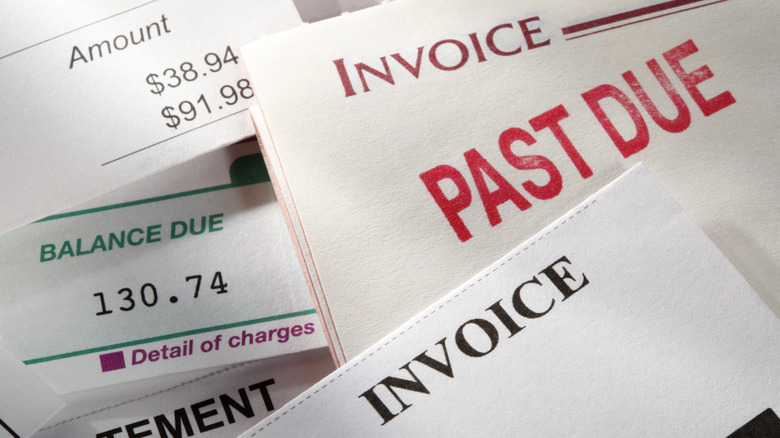Look Out For These Red Flags To Avoid A Reverse Mortgage Scam
Reverse mortgage fraud is a big problem for older homeowners who don't have a lot of cash flow, but do own their homes. Scammers target them by promising to help with their financial problems. They make it sound like a great deal, but reverse mortgages can be risky if you don't fully understand the terms of the loan. Dishonest people will lie about things like getting a steady income or starting a new business with a cash infusion. These scams not only mess with people's money, but also put their homes in danger. The "bad guys" trick them into thinking they can keep their homes, but in reality, they might lose them — or leave their children with lots of debt when they pass away.
However, if older homeowners watch out for these scams, they can protect themselves. Luckily, there are some common red flags to look out for. Whether you are thinking about applying for a reverse mortgage, or someone has suggested that the loan might be a good fit for you, be sure to watch out for these glaring signs that something is amiss.
They call you out of nowhere
One of the first red flags to look out for is when you receive cold calls about the loan. These calls come out of the blue, catching you off-guard. Sometimes, you might have been thinking about taking out a reverse mortgage beforehand. Other times, you have never even heard of the loan before. Yet these scammers seem so friendly and ready to help you out, that you might get sucked in. However, if you're unfamiliar with or don't understand these loans, it's better to avoid dealing with these random callers. It's smarter to make well-informed decisions later on and protect your money.
Unfortunately, it is also not unusual for contractors to use this scam. You might think the calls only come from financial professionals, but it is not uncommon for home renovators to show up out of nowhere and start trying to convince you to fix your property. If you can't afford it, they will easily suggest a reverse mortgage as a quick way to get cash for the renovations. This unsolicited idea might sound helpful, but it can end up causing problems, especially if you don't know much about reverse mortgages.
They falsely claim that the offer involves no cost or effort on your part
A clear sign you might be falling victim to a scam is when the person soliciting you says getting a reverse mortgage is easy and doesn't cost anything. This is a sneaky trick that hides the truth. Remember: Reverse mortgages, like any financial deal, come with costs and things you have to do to make everything work. Even though the loan lets you use the money from your home's equity, you are still on the hook for plenty of expenses. You will need to cover home repairs, property taxes, insurance, and even homeowner's association fees. Borrowing money from your home doesn't make all of these disappear.
In addition, when you have a reverse mortgage, you usually have to sell the home after you die to pay off the debt from your borrowing against your equity. This can be a big deal for your children because they might lose a home that has been in the family for years, or one they expected to inherit. Scammers don't tell you this because they want you to think it's easy and free from consequences.
The scammer avoids providing clear details about the loan or its terms
If you are applying for a reverse mortgage, it is important to make sure you are working with a legitimate loan officer. The best way to avoid a fraudster is to take out a loan with your local bank, or the company with which you had your original mortgage. This way, you already have done business with them and know how they operate.
If you choose someone new, they must provide clear details about the loan and its terms. A scammer will not do this. Instead, someone looking to take advantage of you will not write down most information. It will seem unclear. They might also contradict themselves. This is because a disingenuous person will tell you almost anything to get you to sign the loan papers, whether you understand or not. The biggest red flag is a lender who won't walk you through repayment schedules, interest rates, and default information. To keep yourself safe, be sure you have seen all of these terms in writing before committing to anything.
They discourage you from shopping around for other offers
Another major red flag when considering a reverse mortgage is when the loan officer discourages you from exploring alternative offers. In most financial transactions, it's encouraged to shop around for the best deal. Whether you are buying a house, car, or even a new blender for the kitchen — you should compare offers. Reputable businesses understand and respect this approach. However, if they display possessive behavior and won't let you seek other options, it's cause for concern.
An overly pushy loan officer may have motivations beyond securing the best price for you. They might be more focused on closing the deal quickly to benefit from commissions instead. In contrast, a genuine person will encourage you to explore various offers, providing information and guidance to make a well-informed choice. If your friend or family member is a loan officer and wants to give you a good deal, this can be great news. However, pay attention to their behavior. If they don't think you should talk to anyone else because they "will take care of you," be wary.
They exhibit aggressive and forceful behavior
If the person offering you a reverse mortgage shows any aggressive and forceful behavior, it's a red flag. While everyone can lose their cool in intense situations, it is extremely unlikely that a financial professional who will get you a good deal will. Instead, loan officers are expected to maintain a polite and calm demeanor at all times. If the person becomes rude or threatening at any point during the process, this is a strong indicator of potential fraudulent activity.
When taking out a reverse mortgage, you are making a significant financial decision. This is likely to be an emotional time. You might have lots of questions and come back and forth on what you want to do. If it's not a scam, the loan officer should answer your questions with a smile and patience. Any deviation from this standard is a cause for concern. Aggressive behavior may be an attempt to pressure you into making a decision hastily or to hide crucial information that could affect your choice regarding a reverse mortgage. If you ever feel disrespected, or unsure at any point, trust your gut. It's telling you to pause for a reason. If you felt forced to sign the papers, don't worry. You have a right of recession and can cancel your loan, as long as it is within three days of signing it.
They promise they can help you flip a house
You know those shows on TV where they buy a rundown property, fix it up, and sell it for a huge profit? Well, scammers target people who don't have much money to invest in these kind of projects. They trick homeowners into taking out a reverse mortgage on their house to fund their supposed house-flipping venture. It's a sneaky way to take advantage of people who want to make some cash in the real estate market. The scammers make it seem like the potential profits from flipping the house are guaranteed and worth the risks of a reverse mortgage.
Unfortunately, it doesn't always work out this way. Flipping houses is a risky business and there's no guarantee you'll make money. Putting your primary home on the line for an uncertain investment like this isn't a great idea, especially if you are older and have limited cash flow already. If someone promises that taking out a reverse mortgage will see you on the next episode of "Flip or Flop," you should be wary of their advice.
They ask you to give them power of attorney
Unfortunately, some reverse mortgage scams are created by family members. If somebody asks you for power of attorney, it might seem like a good idea at first. Especially as you grow older, having a trusted friend or family member be able to make complex financial choices on your behalf might seem like a relief. However, it could be really bad if you're not careful. This is because when someone gets power of attorney over you, they have control over your money and financial choices. They can sign loan papers as if they are you, essentially.
Dishonest people can then use this power to take advantage of the reverse mortgage system. They might set up a reverse mortgage in your name without you even knowing. Instead of the money going to you and helping you with more cash flow in your retirement, it goes right into the scammer's pocket. You're left in the dark and a tough spot financially, as you will no longer have your home's equity to rely on. Not only is this a huge money problem, but it's also really hurtful because it's a betrayal from someone close to you. Before giving someone power of attorney, make arrangements that a copy of all financial documents is still sent to you.
They promise your new loan will stop the bank from taking your house
Facing home foreclosure can be terrifying. Unfortunately, this is a situation where scammers can take advantage of your vulnerable emotional state, so be on the lookout for red flags. One glaring one is if someone offering you a reverse mortgage promises it will stop the bank from taking your house. Using these loans to try and stop foreclosure won't always work out. This is because while homeowners might benefit from the cash infusion in the short term, it might not be enough to keep up all the financial responsibilities of running a house.
The money pulled from the home's equity might cover mortgage payments, but it won't cover things like property taxes and insurance. Falling behind on these requirements can also result in losing the house. The reason people offer this as a solution before explaining the full situation is because the scammers only care about making money off of high fees. They don't care about what happens to the homeowners or their houses in the long run. All they want to do is close the deal.
The scammer attempts to impose upfront charges, sometimes merely for providing information
A big red flag for reverse mortgage fraud is when someone tries to charge you upfront before you've even taken out the loan. They will pretend these charges are for information, or even just to start the process. When borrowing money, remember that legitimate mortgage officers and banks do things differently. They will only charge you after they've given you all the important details about the loan. These charges could be for things like applying or getting an appraisal. They'll always be written down clearly before you have to commit to anything.
In contrast, scammers take advantage of people by making them pay before they even tell them anything about the loan. They do this to people who are in a hurry or feeling vulnerable. This way, the homeowner will hand over lots of money to them without really understanding what they're getting into. People who don't know their rights or how loans work often get tricked by these scams. That's why it's so important to learn about the real application process, and to know that if anyone asks for money before they even tell you the loan terms, something is up.
They promise a reverse mortgage will fix all your money problems in retirement
Scammers make it seem like a reverse mortgage can fix all your money problems when you're older. When you are no longer working, or working less, having enough money to cover expenses can be stressful. This is when unethical loan sharks take advantage of older people's worries about money. They try to trick them into thinking that a reverse mortgage is the perfect solution. This is not true because it oversimplifies how these loans work.
The truth is, while a reverse mortgage can give you some extra money by pulling from your home's equity, it's not a one-size-fits-all answer. Sometimes, the money you get can impact the payments you receive from other government help programs, like Medicaid or Supplemental Security Income (SSI). If someone is promising you that this loan will increase your cash flow without any consequences, they might not be telling the truth. For you to benefit from one, be sure your financial advisor is aware of all the moving parts of your retirement. For most, these loans will help them financially, but it is not a total savior.
They encourage you not to tell your spouse
Mortgages are large financial decisions that most couples prefer to make together. In some states, it is legal to apply for one without your spouse. However, if someone is pressuring you to make a large financial choice without telling them (and you feel like you want to!), it is a glaring red flag. First, this level of secrecy can foster immense distrust between partners. You have to wonder why a salesperson would encourage you to keep secrets — likely because what they are doing is wrong or illegal.
Next, taking out a reverse mortgage without your spouse's knowledge can set them up for severe financial distress down the line. This is especially true if you are older than your spouse. If your name is the only one on the documents, if you pass away first, the bank could take the home away from your partner to cover the debts from the reverse mortgage. It is unfair to put them in this position without them knowing. If you are both named on the mortgage, should one of you pass away, the other still gets to stay in the house. Don't let someone pressure you into doing this the wrong way simply because they want to close the deal.
They steal your identity (or just say someone did)
Someone might try to trick you into thinking there is a reverse mortgage on your home. They will send you a suspicious email or text with a link to click, claiming you need to finalize payment information. They might even pose as your bank and say there has been fraud and someone took out a reverse mortgage — click this link right now to report it. In both of these cases, it is better to call your bank or lender directly to ensure you don't fall victim to a phishing scheme with a reverse mortgage as the bait. Scammers think that seniors are not good with technology and will easily fall for these tricks.
In some cases, you might even be the victim of identity theft and there IS a reverse mortgage on your home that you didn't authorize. In this case, you will need to work quickly to reverse the damage to your home. If you receive a notification that your line of equity is shrinking, but you are not getting the money, you must file a police report. You should also contact the loan company to close the account right away.












